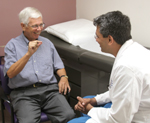|
The MUSC
Movement Disorders Program is
launching the Phase II-Cogane
research study aimed at repairing
the brain of those suffering from
Parkinson's disease.
The drug Cogane
will be administered to about 400
patients nationwide who have early
stages of the disease. In the
study, three doses of Cogane,
administered orally once daily,
will be compared with placebo.
Parkinson's
disease is a debilitating brain
disorder causing symptoms of
tremor, slowness of movement,
stiffness and cognitive decline.
The disorder is progressive, and
there is currently no cure.
 Andy Dowling, left,
a participant in the Phase
II-Cogane research study works
with Dr. Gonzalo Revuelta, Deep
Brain Stimulation Program
director. Sumter resident
Dowling, one of about 400 people
in the nation participating in
the study, is administered
either the drug Cogane or a
placebo orally once a day. Andy Dowling, left,
a participant in the Phase
II-Cogane research study works
with Dr. Gonzalo Revuelta, Deep
Brain Stimulation Program
director. Sumter resident
Dowling, one of about 400 people
in the nation participating in
the study, is administered
either the drug Cogane or a
placebo orally once a day.
The Cogane
study medication is a neurotrophic
factor inducer that has the
potential to enhance the function
of damaged nerve cells in
Parkinson's disease and to protect
other cells from the degenerative
process. Neurotrophic factors are
needed to keep brain cells alive
and to help them heal after an
injury or illness occurs. In
animal studies of Parkinson's
disease, disability was reduced by
43 percent with the Cogane study
drug.
Vanessa Hinson,
M.D., Ph.D., director of the MUSC
Movement Disorders Program, said
this drug, if successful, could
revolutionize the way Parkinson's
disease is treated.
"Early
detection is key, if we can get
patients in before their disease
progresses, we can hopefully
preserve quality of life and
function."
For more
information or to enroll in the
study, contact clinical research
coordinator Jennifer Zimmerman at
792-9115.
For information
on the program, visit http://www.muschealth.com/neurosciences/movementdisorders/.
|



 Andy Dowling, left,
a participant in the Phase
II-Cogane research study works
with Dr. Gonzalo Revuelta, Deep
Brain Stimulation Program
director. Sumter resident
Dowling, one of about 400 people
in the nation participating in
the study, is administered
either the drug Cogane or a
placebo orally once a day.
Andy Dowling, left,
a participant in the Phase
II-Cogane research study works
with Dr. Gonzalo Revuelta, Deep
Brain Stimulation Program
director. Sumter resident
Dowling, one of about 400 people
in the nation participating in
the study, is administered
either the drug Cogane or a
placebo orally once a day.